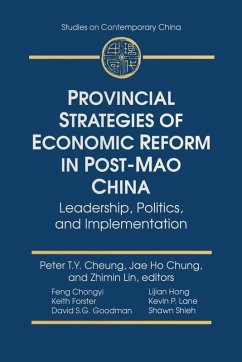
Provincial Strategies of Economic Reform in Post-Mao China
Leadership, Politics, and Implementation
Versandkostenfrei!
Versandfertig in 1-2 Wochen
112,99 €
inkl. MwSt.
Weitere Ausgaben:

PAYBACK Punkte
56 °P sammeln!
This book studies economic decentralization in eight Chinese provinces -- Shanghai, Zhejiang, Guangdong, Shaanxi, Shandong, Fujian, Hainan, and Sichuan -- by focusing on the role of provincial leadership in the initiation and implementation of economic reform.














